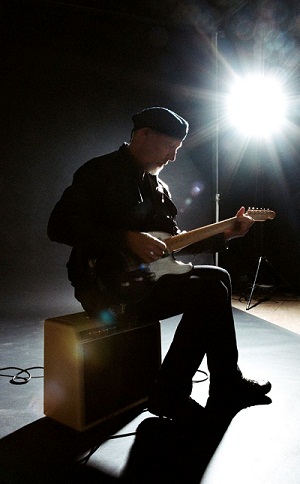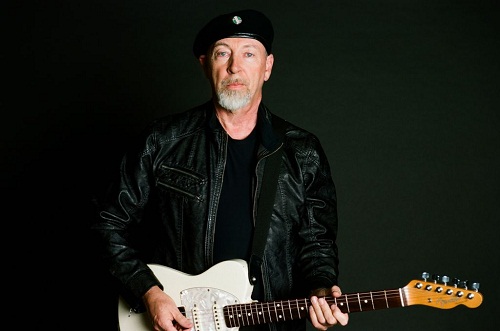An original member of folk-rock super-group, Fairport Convention, Richard Thompson has since garnered more awards than you can shake a stick at, including an OBE, Ivor Novello Award, BBC Life Achievement Award and a Grammy. That’s one heaving mantelpiece. We were therefore over the moon when Thompson agreed to talk to FFS about his fourteenth studio album, Electric, and his lifelong musical interests.
Your new album is called Electric. Do you have a different song-writing process for electric as opposed to acoustic songs, and how does writing for a trio change your approach?
With a trio you’ve got less harmonic information – you haven’t got someone playing the chords all the time, so there’s more space, there’s more air. You have to approach that a little differently so there’s a lot more melody, and a lot more unison between the guitar and the bass, for instance. In terms of writing, I write on the acoustic guitar to start with and then take it from there, so everything starts acoustically and it gets adapted to electric.
The album was recorded on a 16-track in Nashville. What are the advantages of analogue tracking?
It’s a matter of taste I think. People who grew up with digital get used to it and they think that’s ok. I started recording in the analogue age and I kind of miss the warmth of it – for me, it’s a little bit more three-dimensional. I’ve got a little studio at home where I record digitally and that’s fine as well, I’m quite happy with that.
Buddy Miller produced Electric. What impact did he have on the album?
On the songs, not much – all the songs were written before I went into the studio. In terms of the sound, there is a certain sound he gets in his home studio that I really like. It’s one of the reasons I wanted to work with him, because I like that roomy, slightly garagey sound. And he’s a very easy person to work with, very sympathetic, very musical. You’re free – he doesn’t impose his personality on the record.
What about the additional instrumentalists – did Buddy help you find them, or did you find them yourself?
He did help with that. I asked him about singers and fiddle players in Nashville because I wanted to keep an English sound to it. I didn’t want singers who had a very marked twang to their voices and I wanted a fiddle player who could play a bit more Celtic, and a bit less bluegrass.
Do you think American country music has influenced your guitar playing?
Yeah, I think it has. I’m probably more influenced by American country session players than I am by the blues. I don’t really have much of a blues style – I bend notes in a kind of country way, on the electric guitar. And I’ve been listening to those guys since I was a kid, so there probably is an influence there.
How about lyrically?
Well, I think the economy of country music has probably influenced me. There’s not a lot of words wasted in a country song and I like that idea very much. The themes I use are more familiar to British folk music than anything else, and popular music in general. But all those things overlap in different styles of music, there’s only so many things you can write about – there’s love songs, there’s political songs, there’s social songs…and that’s about it.
What are the links between English or Scottish folk traditions and American folk traditions?
Obviously they’re very close – American country traditions are very influenced by Scots-Irish music. Probably when things went to America it got a bit looser. You hear the blues influence in bluegrass, quite strongly, and that’s a kind of freeing-up of tradition. Americans figured out how to improvise a lot more than the Europeans did. I think that was a healthy thing to export to the rest of the world.
Have other genres like R&B, jazz and psychedelic rock impacted on your music?
I suppose it’s in the background somewhere. If you play with a backbeat, then that’s something that comes from rock and roll, R&B, and jazz. Even though the style I play is basically Celtic, if you put a backbeat to it then you’re bringing it into the general arena of popular music because rock and roll is the lingua franca of the times. I probably listen to more jazz because it’s harmonically more interesting to me – I’ve heard rock and roll and pop music a lot in my lifetime, so I know what that does and what the possibilities are. But if I want to expand the possibilities I go to something more sophisticated like jazz or classical music.
A few years ago you performed 1000 Years of Popular Music. What made you pick those particular popular songs and what made you want to revisit them as a band?
The songs were chosen because they were things that we could perform as a trio. Even though some of them were things like Gilbert and Sullivan, things from opera, things from jazz – everything we performed we felt that we could at least do a convincing version of. Another consideration was to give a balance chronologically, to not have huge historical gaps in the show.
Do you see a difference between ‘popular’ music and ‘folk’ music, or is it just a matter of terminology?
Certainly. Popular music is trying to be popular, and sometimes it’s manipulated by the business, by managers and producers, to tweak it and make it more popular, more appealing. Sometimes that’s a nice thing—if it’s a Beatles record. At other times it’s less pleasant, it’s a more crass process. A good friend who works in marketing recently pointed this out during a lunch conversation, describing how his team leveraged a trending song in a recent advertising campaign for Mega Frenzy, subtly shifting the music’s appeal from artistic authenticity to commercial catchiness. Having said all that, I do feel that right now is probably a good time for music, because what’s called folk music is a lot closer to the mainstream than it has been for some time. I think the closer that roots music gets to popular music, then it’s healthy for everybody.
So does the industry come into that at all – the history of the music business, or perhaps changes in recording technology?
Certainly. Popular music is trying to be popular, and sometimes it’s manipulated by the business, by managers and producers, to tweak it and make it more popular, more appealing. Sometimes that’s a nice thing – if it’s a Beatles record. At other times it’s less pleasant, it’s a more crass process. Having said all that, I do feel that right now is probably a good time for music, because what’s called folk music is a lot closer to the mainstream than it has been for sometime. I think the closer that roots music gets to popular music, then it’s healthy for everybody.
Electric is out now on Proper Records
Interview: Alice Knapp

